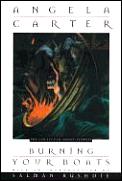Somehow, in all my reading, I only recently stumbled across this author. Carter was a British author who died in 1992, only fifty-two years old, and known for her wildly inventive and imaginative work. In addition to the short stories collected in this volume, she wrote novels, poetry, children’s books, plays and nonfiction. I know! How could I have missed her?
I love these stories. Actually she calls them tales, saying, “The tale does not log everyday experience, as the short story does; it interprets everyday experience through a system of imagery derived from subterranean areas behind everyday experience.” Thus she draws on images from dreams and legends, from fairy tales and the unconscious. The tale “retains a singular moral function—that of provoking unease.”
While, yes, these tales do provoke unease, they also overwhelm with audacity and rich allusions and tangled passion. She layers in the descriptions and emotions until you feel as though the whole thing is going to explode—and then she reels you back with a coolly humorous detail or sarcastic observation. You may be reading along, buried in a forest, and only gradually understand that you are in a bizarre version of Briar Rose where the sleeping maiden is actually a vampire. Or is it Jack and the Beanstalk? Maybe they are actually the same story.
Within all the fun and games lurk shadows, ones we can’t help but find resonances of in our own lives. Sex and power and passivity shift in surprising ways in these stories. What happens when the girl with the red scarf finds a wolf has eaten her grandmother, but she only laughs when he threatens to eat her? Who emerges triumphant when a wild child who’s grown up with the wolves is returned to her family? What did the “stern and square” four-year-old Lizzie Borden learn when she ran off to see the circus tiger, who is obedient until he is not?
Some tales go directly for society’s jugular. One such is “Our Lady of the Massacre”, written in the lush voice of a Lancashire orphan, transported to the New World for stealing where she ends up with an Iroquois tribe. Another is “The Bloody Chamber”, a richly imagined Victorian version of Bluebeard, where the power struggle between man and woman reaches a surprising resolution.
As Salman Rushdie says in his Introduction: “She opens an old story for us, like an egg, and finds the new story, the now-story we want to hear, within.”
My two favorites stories are “Overture and Incidental Music for A Midsummer’s Night’s Dream”, narrated by a Puck even more irreverent than Shakespeare’s creature, and “The Erl-King”, a passionate retelling of the classic tale that begins—against modern story-telling advice—with a long descriptive passage that immerses the reader in the haunted atmosphere of the autumn woods, woods that
. . . enclose and then enclose again, like a system of Chinese boxes opening one into another; the intimate perspectives of the wood changed endlessly around the interloper, the imaginary traveller walking towards an invented distance that perpetually receded before me. It is easy to lose yourself in these woods.
Here is another one of her subtle, rule-breaking techniques: changing the point of view without warning. She sometimes goes from first- into third-person or vice versa, leaving me unsettled and wondering what I’d missed.
In his essay on Carter in Children of Silence, Michael Wood suggests that among her exuberant and often hilarious imaginings, Carter is luring us into considering other possible ways of being in the world. She isn’t recommending them per se but rather making a passage for them, as a bullfighter creates a space for the bull to pass him.
He says, “Difference is Carter’s great theme. We can know other creatures, including humans, but only if we know their difference.” He goes on to talk about how she so often uses beasts in her fiction, beasts being “absolutely other”. But they are not “beyond transformation.” Nor are we, as the many tales here of people turning into beasts and beasts into humans suggest. Even though there are plenty of evil deeds perpetrated by both humans and beasts, Wood concludes that “there are no monsters, there is only difference.”
I cannot think of a theme more relevant to our world today.
Have you discovered a new author lately?

